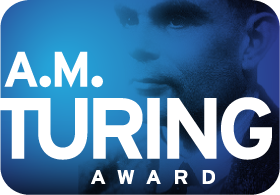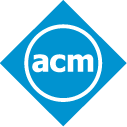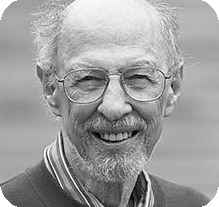
A.M. TURING AWARD WINNERS BY...
Fernando J ("Corby") Corbato

United States – 1990
Short Annotated Bibliography
- J. A. Stratton, P. M. Morse, L. J. Chu, J. D. C. Little and F. J. Corbato, Spheroidal Wave Functions Including Tables of Separation Constants and Coefficients, MIT Press, 1959. A set of tables of spheroidal wave functions designed to simplify the computation of acoustic and electromagnetic scattering from spheroids. The tables were computed to five-place accuracy on the Whirlwind digital computer, and automatically tabulated.
- Corbató, F. J., M. M. Daggett, and R. C. Daley, “An experimental time-sharing system”, AFIPS Conference Proceedings, Vol. 21, pp. 335-344, 1962. http://larch-www.lcs.mit.edu:8001/~corbato/sjcc62/ One of the first formal papers describing an implemented time-sharing system. Describes the need for time-sharing, and the features and implementation problems of CTSS as of 1962. Also describes the multi-level feedback queue scheduling algorithm employed in CTSS.
- Corbató, F. J., M. M. Daggett, R. C. Daley, R. J. Creasy, J. D. Hellwig, R. H. Orenstein, and L. K. Korn, The compatible time-sharing system: a programmer's guide, 1st ed, MIT Press, June 1963, http://www.bitsavers.org/pdf/mit/ctss/CTSS_ProgrammersGuide.pdf The so-called "candy stripe" manual that described early versions of CTSS.
- Corbató, F. J., and V. A. Vyssotsky, “Introduction and overview of the Multics system”, AFIPS Conference Proceedings, Vol. 27, pp. 185-196, 1965, http://www.multicians.org/fjcc1.html Formal paper introducing the goals and plans for Multics (Multiplexed Information and Computing Service), planned to be implemented on the GE 645 computer. Introduces the goal of serving as a "computer utility" similar to electric power utilities.
- Corbató, F. J., C. T. Clingen, and J. H. Saltzer, “Multics -- the first seven years”, Proceedings of the Spring Joint Computer Conference, pp. 571-583, May 1972, http://www.multicians.org/f7y.html Goals, history and status of the Multics project as of 1972. Describes five key insights and their realization: modular division of responsibility, dynamic reconfiguration, automatically managed multilevel memory, protection of programs and data, and use of PL/I as a system programming language.
- Corbató, F. J., and C. T. Clingen, “A Managerial View of the Multics System Development”, in Research Directions in Software Technology, edited by P. Wegner, M.I.T. Press, 1979, http://www.multicians.org/managerial.html Goals, history and status of the Multics project as of 1977. Describes technical, managerial, and organizational problems encountered, and management tools employed. Four major reasons for success are described: evolutionary design, goal documentation, high-level language implementation, and personal dedication.
- Corbató, F. J., “On building systems that will fail”, (A. M. Turing Award lecture), Communications of the ACM, Vol. 34, No. 9, September 1991. http://larch-www.lcs.mit.edu:8001/~corbato/turing91/ A high-level view of large, complex systems and how their actual behavior can diverge from human expectations. Examples from the history of CTSS and Multics.
- Ritchie, D. M., “UNIX Time-Sharing System: A Retrospective,” Bell System Technical Journal, Vol. 57 Num. 6, October 1978, pp. 1947-1969. A description of the UNIX operating system.
- Walden, David, and Tom Van Vleck, Compatible Time Sharing System (1961-1973) Fiftieth Anniversary Commemorative Overview, IEEE Computer Society, Washington DC, 2011. http://www.multicians.org/thvv/compatible-time-sharing-system.pdf The IEEE Computer Society History Committee prepared a document in June 2011 in honor of the 50th anniversary of CTSS. It contains an extensive bibliography and interviews with former developers and users.
- Multicians web site, http://www.multicians.org/ Comprehensive history of the Multics system, its builders, and its uses.
- Frenkel, Karen, "An interview with Fernando Jose Corbató", Communications of the ACM, Volume 34 No. 9, Sept. 1991, http://portal.acm.org/citation.cfm?doid=114669.114688 Corby discusses his history, including Whirlwind, CTSS, Project MAC, and Multics.
- Norberg, Arthur L., "An interview of Fernando Corbató, conducted by Arthur L. Norberg on 18 April 1989 and 14 November 1990," Charles Babbage Institute call number OH 162, conservancy.umn.edu/bitstream/107230/1/oh162fjc.pdf Professor Corbató discusses computer science research, especially time-sharing, at the Massachusetts Institute of Technology (MIT), including Whirlwind, CTSS, and Multics.
- Webber, Steven H., "Oral History of Fernando Corbató conducted by Steven Webber on February 1, 2006," Computer History Museum reference number X3438.2006. http://archive.computerhistory.org/resources/access/text/Oral_History/102658041.05.01.acc.pdf Fernando Corbató reviews his early educational and naval experiences in the Eddy program during World War II. A detailed exploration of Corbató's time-sharing systems projects including the Compatible Time-Sharing System (CTSS), Project MAC, and Multics completes the oral history.
- Corby was interviewed by John Fitch for "MIT Science Reporter" On WGBH-TV Boston on May 9, 1963, http://www.youtube.com/watch?v=Q07PhW5sCEk Prof. Corbató demonstrated CTSS running on MIT's IBM 7090. The program aired on WGBH on May 16, 1963.




























 THE A.M. TURING AWARD
THE A.M. TURING AWARD